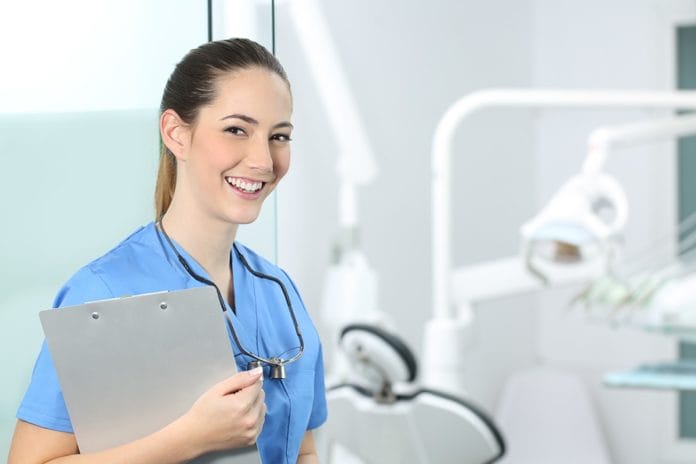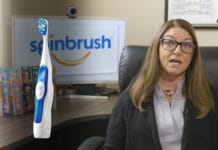As I mentioned in part one of this series, Different Stages of Career, part two will focus on a dental hygienist from Massachusetts, who wishes to remain anonymous. She did attend the same dental hygiene school with Mary Reis, RDH (who was featured in part one). The goal of having two hygienists with the same career experience is to see what is similar and what is different.
They share similarities such as the location of their education and years practicing, but they live and work in different states.
This Massachusetts dental hygienist has been working clinically for almost three and a half years. She will be working in the same private practice for almost three years in October. Her practice includes one dentist and four part-time hygienists. If she was not a dental hygienist, she would be staying in the health-care lane as an epidemiologist. Additionally, she is very interested in public health and would eventually like to work more within that sector of dental hygiene.
Machado: What got you into dental hygiene?
MA RDH: I had always wanted to work in health care. I originally wanted to go to school to become a nurse like my mother, but I decided that hygiene was a better fit for me due to the family-friendly hours and good pay.
Machado: What’s one thing you remember from dental hygiene school? Good, bad, or funny?
MA RDH: I remember I was so nervous for my periodontal probing assessment back in dental hygiene school. Every time I placed the probe into the sulcus my teacher said, “No.” I ended up crying in the middle of it. I still passed.
Machado: What’s one thing you wished you knew before going into dental hygiene?
MA RDH: I wished I knew how driven treatment plans are by insurance companies. A lot of the time, an insurance company may not approve what is needed for the patient. When this happens, the patient and the office end up in a standstill on treatment, which gets very frustrating for all parties involved − dental professionals and the patient.
Machado: What do you do to remain healthy, such as how do you avoid or handle health concerns related to the profession such as wrist issues or other ergonomic issues?
MA RDH: In 2018, I suffered from a pinched sciatica nerve and had to call out of work for a week. I realized I was barely a year into my career, and I needed to take care of my body better. I now have a saddle chair and loupes. I also stand for every other patient. I work out four to five days a week and focus on core exercises and yoga.
Machado: Do you have any memorable clinical stories?
MA RDH: I have seen #29 laying completely horizontal in the mandible on a radiograph. I have also seen someone with seven third molars. It was amazing to see so many extra molars in the maxillary arch. There were three each in quadrant one and two in quadrant two. On the mandibular arch, there were only #17 and #32.
Machado: Describe your first job out of hygiene school? Was it a good or bad experience?
MA RDH: An opportunity opened up to cover maternity leave at a pediatric office when I graduated and received my license. I covered the maternity leave and stayed on two days a week for almost a year. I did eventually leave the practice because I felt underappreciated as an employee.
I still love seeing pediatric patients and would love to work at a pediatric office again one day. It was a great first office to work at. I gained a lot of knowledge and tips for caring for the pediatric population I brought with me to my current office.
Machado: What’s an obstacle or challenge you have faced at work, such as patient compliance, a fellow employee, or an insurance company?
MA RDH: I have come to realize that not every patient is going to like you. It is hard to not take it to heart at first. It will have nothing to do with you personally or your skills as a hygienist. I’ve been fortunate enough to only have a few negative experiences with patients. They now see a different hygienist, and everyone is happy.
Machado: What’s the biggest lesson you have learned from your dental hygiene career experience?
MA RDH: One word, patience. As many of us know, dental anxiety and fear are part of the day to day operations when caring for patients. You realize that each patient acts differently to their fear, and we need to have empathy and understanding. This may include taking things slow and explaining the process step by step.
Machado: What’s your advice to a new grad? A future dental hygienist? Or a dental hygienist with a few years under their belt?
MA RDH: Take a chance on any new opportunities. My first job out of hygiene school was a temping job that I randomly stumbled across, and I fell in love with it. I started the next day with zero experience and ended up staying past the maternity leave I was covering. I was fortunate in that I took a chance to gain professional experience, even though it’s scary when you start.
Machado: What’s the proudest moment of your career so far?
MA RDH: The proudest moment of my career was with a patient who has dementia and is mostly nonverbal. She held my hand and said my name during treatment one day. I always compliment her on her manicure, and it always puts a smile on both of our faces.
Machado: What’s next for you in your career?
MA RDH: I am still growing my patient base and adding more hours to my schedule. I currently work part-time but will hopefully be full time soon!
Machado: Where do you see the dental hygiene profession in 10 years?
MA RDH: I see our profession becoming more independent. I believe in 10 years that dental hygienists will own their own practices.
Machado: Is there anything you wish you could change about the profession?
MA RDH: This circles back to the issue with insurance companies. I wish treatment didn’t have to depend on insurance companies. A lot of patients simply do not have the finances to pay out of pocket for a lot of treatment. I wish dentistry did not have to be so expensive and could be more accessible to those in lower socioeconomic status communities.
Machado: What is your favorite part of being a dental hygienist?
MA RDH: My favorite part of being a hygienist is getting to know my patients and seeing a positive change in their oral health after working with them consistently.
Machado: Any other comments about your experience, perspective, advice, feedback, etc.
MA RDH: I want any hygienist, new or seasoned, to know their worth. Be confident in your skills and don’t stay trapped in a work environment that does not appreciate you.
Both hygienists were not in contact with each other during the interview processes. I thought it was amazing to see how their answers were almost identical to each other, such as the “knowing your worth” advice. They wanted other hygienists to understand that knowing your worth is a crucial part of your career.
You are a professional health-care provider, which means you have an education and skill set. If fellow employees, employers, or work environments are not bringing out the best in you, or you don’t feel you can be successful there, it’s time to move forward somewhere else.
Every hygienist has experienced the struggle and frustrations of insurance companies approving necessary dental and periodontal treatments. Maneuvering through difficulties like that can be upsetting, but they have also shared positives, like the idea that, in ten years, dental hygienists will be able to own their own dental practices.
This dental hygiene field is forever changing, especially in these new health care times. We must continue to press forward and adapt to give the best care we can give to each patient. It won’t be a breeze at times. You may feel frustrated or discouraged, but, at the end of the day, the most important thing is knowing that you do make an impact on someone’s health as a registered dental hygienist.
Before you leave, check out the Today’s RDH self-study CE courses. All courses are peer-reviewed and non-sponsored to focus solely on high-quality education. Click here now.












